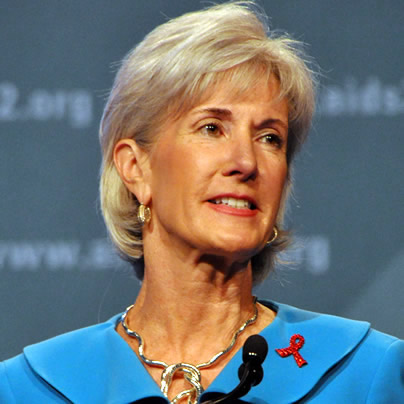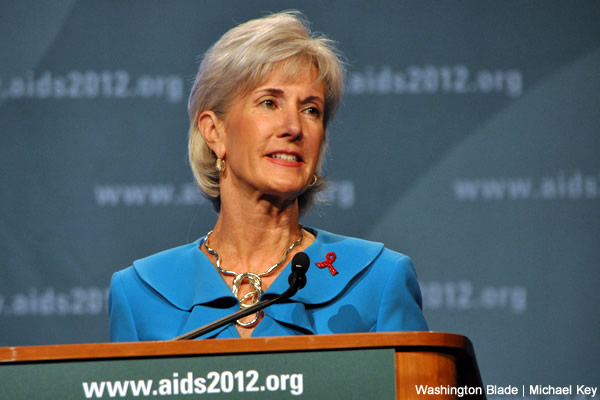National
AIDS 2012: Sebelius unveils public-private collaborations to fight disease
HHS to work with MAC AIDS Fund, Walgreens, others


Secretary of Health & Human Services Kathleen Sebelius announced four HIV/AIDS private-public initiatives Sunday. (Blade photo by Michael Key)
Health & Human Services Secretary Kathleen Sebelius announced four new public-private initiatives on Sunday night aimed at removing barriers that cause some living with HIV/AIDS within the United States to fall out of care.
Sebelius announced the projects — including a new $4.5 million multi-year project with the MAC AIDS Fund called the Care for Life Initiative — during remarks she delivered as the final speaker on the opening night of the 19th International AIDS Conference, which is being held in the United States for the first time since 1990. An estimated 25,000 are in attendance for the week-long conference in D.C.
“Perhaps the most important principle in our national strategy is one we’ve been reminded of over and over again in our response to HIV/AIDS: none of us can do this alone,” Sebelius said. “That’s why we’re making a new effort to reach to community-based organizations, businesses, foundations, NGOs, faith organizations and more.”
The Care for Life Initiative is a collaboration of the MAC AIDS fund, which was established in 1994 to support people who are living with HIV/AIDS across the world, and has three arms that aim to keep people with HIV/AIDS within care, according to a statement from the organization:
- A $4 million partnership with AIDS United over the next three years to create an innovation fund on the both the national and regional levels to improve retention in care and treatment adherence. Geographic focuses will be determined based on need and capacity of the local providers to address that need. It will also involve an open call for proposals.
- Working with the Health Resources and Services Administration, or HRSA, for a pilot launch of UCARE4LIFE, an evidence-based program that will employ mobile texting to improve care retention and medication adherence. With a focus on Southern states, the two-year project consists of developing a message library for delivering phone text notifications to HIV-positive individuals — in English and Spanish — regarding medical appointment reminders and taking medications.
- MAC AIDS Fund will work with HHS and the President’s Emergency Plan for AIDS Relief to convene a meeting of international leaders in fall 2012 on leveraging global lessons on HIV care. This forum is expected to explore lessons from PEPFAR that can be applied to the United States for best practices on treatment and retention.
According to the MAC AIDS Fund, under the current system, one in two people living with HIV/AIDS in the United States falls out of care.
Nancy Mahon, global executive director of the MAC AIDS Funds, said the Care for Life Initiative is important because it uses new technologies and ideas in its outreach to people with HIV/AIDS.
“We cannot end the epidemic without breakthrough approaches that support and empower those living with HIV/AIDS to stay connected to the care and life-saving treatment they deserve,” Mahon said.
Besides the Care for Life Initiative, Sebelius also hit on the other three initiatives during her remarks. With the pharmaceutical retailer Walgreens, she announced a three-year partnership with the Centers for Disease Control to explore ways in which pharmacies can help patients stay on their medications. According to a news statement, Walgreens is supplying nearly $1 million in in-kind services for this initiative.
With Medscape, a leading provider of online continuing education for U.S. clinicians, Sebelius unveiled partnership training programs with the Centers for Medicare & Medicaid to help clinicians better understand and address HIV patients’ needs. According to a news statement, three new training modules have already been created for physicians, nurses and other medical professionals.
Finally, Sebelius announced that HHS is partnering with the eight largest AIDS drug companies — Abbot Laboratories, Boehringer Ingelheim, Bristol Myers Squibb, Gilead, Genentech, Johnson & Johnson, Merck and ViiV — to create a single application form for AIDS medications offered through their patient assistance programs.
“I want to thank all of these partners for stepping up,” Sebelius said. “And we will continue to seek out new public-private collaborations that will help us beat this disease.”
In addition to announcing the new public-private partnerships, Sebelius also revealed that the Food & Drug Administration would announce this week that more than 150 antiretroviral drugs are now available through PEPFAR.
The secretary also enumerated earlier initiatives of the Obama administration, including last week’s decision to distribute nearly $80 million to the states “to allow them to fully clear” wait lists for AIDS Drug Assistance Programs, which provide HIV/AIDS drugs to low-income people. An estimated 2,000 people nationwide had been awaiting drugs through programs.
According to a statement from HHS, around $69 million will be sent to 25 states and territories and, based on estimates provided by the states, will eliminate any waiting lists. The remaining $10 million — a portion of which was allocated by the Affordable Care Act — will be distributed to community-based health clinics nationwide to expand access for 14,000 new HIV/AIDS patients for medical and support services.
Other initiatives against HIV/AIDS under the Obama administration that Sebelius touted were recent FDA approval of an at-home HIV test and using Truvada to prevent HIV infection. Sebelius also credited the Bush administration, calling PEPFAR, which was established under the previous administration, one of “the great health success stories of the 21st century.”
“Our task now is to make it even stronger,” Sebelius said.
“Under President Obama, we’re on pace to achieve an ambitious goal of reaching an additional two million people around the world with life-saving treatment by the end of 2013. At the same time, we’re putting a renewed focus on the key ‘combination prevention’ interventions that have proven most effective in combating HIV.”
The secretary’s mention of PEPFAR received among the most applause of anything discussed that evening before an audience that included many HIV/AIDS advocates from overseas. Obama’s fiscal year 2013 budget request cuts the program by half a billion dollars, but the White House has said PEPFAR is an example of a program that is doing more with less because of the reduced cost of drugs.
Sebelius wasn’t the only public official representing the United States on the stage during the opening night of the conference. Rep. Barbara Lee (D-Calif.), a renowned LGBT and HIV/AIDS advocate, also spoke on stage to call for an end to the epidemic, observing it has had a particularly devastating impact on black Americans.
“Although AIDS has made the transition from a death sentence to a chronic disease, new infections unfortunately continue at alarming rates,” Lee said. “HIV/AIDS disproportionately affects no group of people in our country more than African Americans. Of the 1.4 million people in the United States living with HIV, nearly half are black men and women, even though blacks make up 14 percent of the population.”
Last week, Lee announced that had introduced into the U.S. House legislation called the “Ending the HIV/AIDS Epidemic Act.” The bill has 26 co-sponsors who are all Democrats and aims to establish a policy and financing framework to eliminate AIDS domestically and abroad.
The bill aims to fight HIV/AIDS by providing additional funds for programs such as the AIDS Drug Assistance Programs; addressing policy barriers to accessing prevention and care, such as encouraging condom use in prisons; and calling for a more advanced strategy overseas to end the global AIDS epidemic.
D.C. Mayor Vincent Gray also took to the stage to welcome international attendees to D.C. and talk about how HIV/AIDS has impacted the city.
“HIV/AIDS has crossed all racial, ethnic, religious and socio-economic borders,” Gray said. “It is a disease that knows no boundaries.”
According to Gray, an estimated 20,000 people in D.C. have been infected with HIV/AIDS, and 10,000 residents have died as a result of the disease.
Other speakers on Sunday were Annah Sango, a Zimbabwe advocate living with HIV who seeks visibility for female patients, World Bank President Jim Yong Kim, who said he was the first World Bank president to the address the international conference, UNAIDS Executive Director Michel Sidibé, South African Deputy President Kgalema Motlanthe and Mark Dybul, global AIDS coordinator for President George W. Bush who touted that administration’s achievements in the global AIDS fight.
The co-chairs of the conference, Elly Katabira, a Ugandan activist and president of the International AIDS Society, and Diane Havlir, chief of HIV/AIDS Division at the University of California, San Francisco, welcomed attendees to the conference. U.N. Secretary General Ban Ki-Moon prepared a video message for attendees.
Also on Sunday, the White House unveiled a video message from Obama welcoming the international attendees to the conference. The video message was prepared in lieu of a live appearance by Obama at the conference.
In the video, Obama talks about HIV/AIDS advocates’ commitment to fighting the disease and a voice-over talks about discovery of the disease in the 1980s as well as activism and scientific advances to thwart it.
Watch the video below:
U.S. Supreme Court
Supreme Court to consider bans on trans athletes in school sports
27 states have passed laws limiting participation in athletics programs

The U.S. Supreme Court on Thursday agreed to hear two cases involving transgender youth challenging bans prohibiting them from participating in school sports.
In Little v. Hecox, plaintiffs represented by the ACLU, Legal Voice, and the law firm Cooley are challenging Idaho’s 2020 ban, which requires sex testing to adjudicate questions of an athlete’s eligibility.
The 9th U.S. Circuit Court of Appeals described the process in a 2023 decision halting the policy’s enforcement pending an outcome in the litigation. The “sex dispute verification process, whereby any individual can ‘dispute’ the sex of any female student athlete in the state of Idaho,” the court wrote, would “require her to undergo intrusive medical procedures to verify her sex, including gynecological exams.”
In West Virginia v. B.P.J., Lambda Legal, the ACLU, the ACLU of West Virginia, and Cooley are representing a trans middle school student challenging the Mountain State’s 2021 ban on trans athletes.
The plaintiff was participating in cross country when the law was passed, taking puberty blockers that would have significantly reduced the chances that she could have a physiological advantage over cisgender peers.
“Like any other educational program, school athletic programs should be accessible for everyone regardless of their sex or transgender status,” said Joshua Block, senior counsel for the ACLU’s LGBTQ and HIV Project. “Trans kids play sports for the same reasons their peers do — to learn perseverance, dedication, teamwork, and to simply have fun with their friends,” Block said.
He added, “Categorically excluding kids from school sports just because they are transgender will only make our schools less safe and more hurtful places for all youth. We believe the lower courts were right to block these discriminatory laws, and we will continue to defend the freedom of all kids to play.”
“Our client just wants to play sports with her friends and peers,” said Lambda Legal Senior Counsel Tara Borelli. “Everyone understands the value of participating in team athletics, for fitness, leadership, socialization, and myriad other benefits.”
Borelli continued, “The U.S. Court of Appeals for the Fourth Circuit last April issued a thoughtful and thorough ruling allowing B.P.J. to continue participating in track events. That well-reasoned decision should stand the test of time, and we stand ready to defend it.”
Shortly after taking control of both legislative chambers, Republican members of Congress tried — unsuccessfully — to pass a national ban like those now enforced in 27 states since 2020.
Federal Government
UPenn erases Lia Thomas’s records as part of settlement with White House
University agreed to ban trans women from women’s sports teams

In a settlement with the Trump-Vance administration announced on Tuesday, the University of Pennsylvania will ban transgender athletes from competing and erase swimming records set by transgender former student Lia Thomas.
The U.S. Department of Education’s Office for Civil Rights found the university in violation of Title IX, the federal rights law barring sex based discrimination in educational institutions, by “permitting males to compete in women’s intercollegiate athletics and to occupy women-only intimate facilities.”
The statement issued by University of Pennsylvania President J. Larry Jameson highlighted how the law’s interpretation was changed substantially under President Donald Trump’s second term.
“The Department of Education OCR investigated the participation of one transgender athlete on the women’s swimming team three years ago, during the 2021-2022 swim season,” he wrote. “At that time, Penn was in compliance with NCAA eligibility rules and Title IX as then interpreted.”
Jameson continued, “Penn has always followed — and continues to follow — Title IX and the applicable policy of the NCAA regarding transgender athletes. NCAA eligibility rules changed in February 2025 with Executive Orders 14168 and 14201 and Penn will continue to adhere to these new rules.”
Writing that “we acknowledge that some student-athletes were disadvantaged by these rules” in place while Thomas was allowed to compete, the university president added, “We recognize this and will apologize to those who experienced a competitive disadvantage or experienced anxiety because of the policies in effect at the time.”
“Today’s resolution agreement with UPenn is yet another example of the Trump effect in action,” Education Secretary Linda McMahon said in a statement. “Thanks to the leadership of President Trump, UPenn has agreed both to apologize for its past Title IX violations and to ensure that women’s sports are protected at the university for future generations of female athletes.”
Under former President Joe Biden, the department’s Office of Civil Rights sought to protect against anti-LGBTQ discrimination in education, bringing investigations and enforcement actions in cases where school officials might, for example, require trans students to use restrooms and facilities consistent with their birth sex or fail to respond to peer harassment over their gender identity.
Much of the legal reasoning behind the Biden-Harris administration’s positions extended from the 2020 U.S. Supreme Court case Bostock v. Clayton County, which found that sex-based discrimination includes that which is based on sexual orientation or gender identity under Title VII rules covering employment practices.
The Trump-Vance administration last week put the state of California on notice that its trans athlete policies were, or once were, in violation of Title IX, which comes amid the ongoing battle with Maine over the same issue.
New York
Two teens shot steps from Stonewall Inn after NYC Pride parade
One of the victims remains in critical condition

On Sunday night, following the annual NYC Pride March, two girls were shot in Sheridan Square, feet away from the historic Stonewall Inn.
According to an NYPD report, the two girls, aged 16 and 17, were shot around 10:15 p.m. as Pride festivities began to wind down. The 16-year-old was struck in the head and, according to police sources, is said to be in critical condition, while the 17-year-old was said to be in stable condition.
The Washington Blade confirmed with the NYPD the details from the police reports and learned no arrests had been made as of noon Monday.
The shooting took place in the Greenwich Village neighborhood of Manhattan, mere feet away from the most famous gay bar in the city — if not the world — the Stonewall Inn. Earlier that day, hundreds of thousands of people marched down Christopher Street to celebrate 55 years of LGBTQ people standing up for their rights.
In June 1969, after police raided the Stonewall Inn, members of the LGBTQ community pushed back, sparking what became known as the Stonewall riots. Over the course of two days, LGBTQ New Yorkers protested the discriminatory policing of queer spaces across the city and mobilized to speak out — and throw bottles if need be — at officers attempting to suppress their existence.
The following year, LGBTQ people returned to the Stonewall Inn and marched through the same streets where queer New Yorkers had been arrested, marking the first “Gay Pride March” in history and declaring that LGBTQ people were not going anywhere.
New York State Assemblywoman Deborah Glick, whose district includes Greenwich Village, took to social media to comment on the shooting.
“After decades of peaceful Pride celebrations — this year gun fire and two people shot near the Stonewall Inn is a reminder that gun violence is everywhere,” the lesbian lawmaker said on X. “Guns are a problem despite the NRA BS.”





















